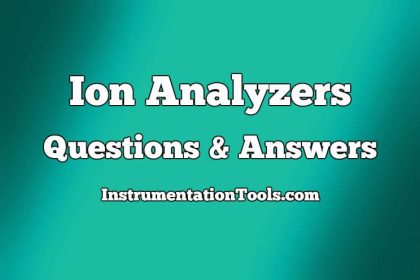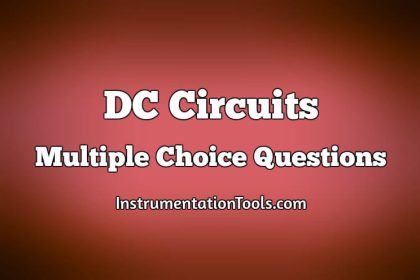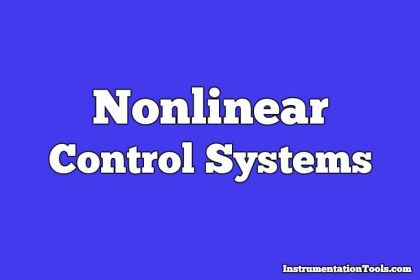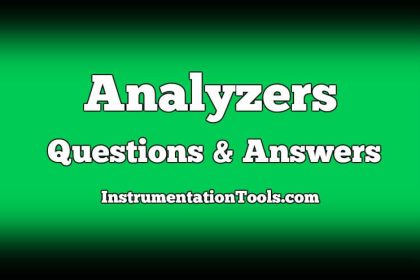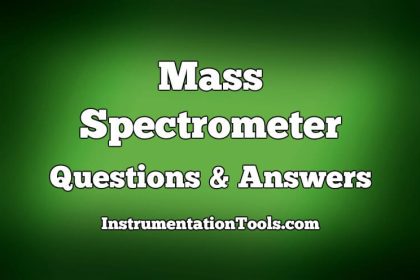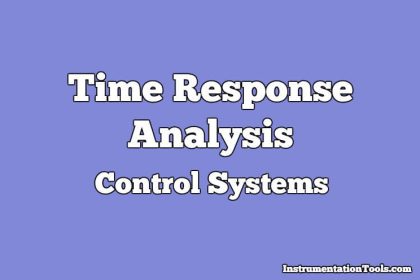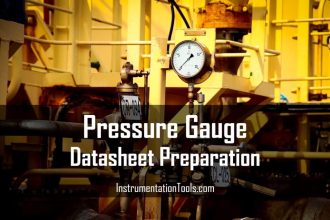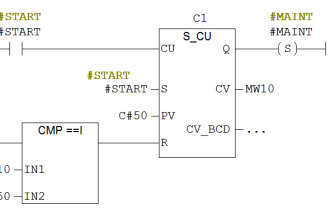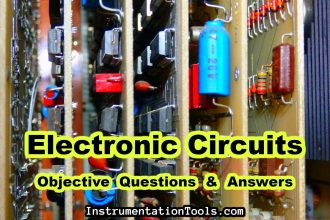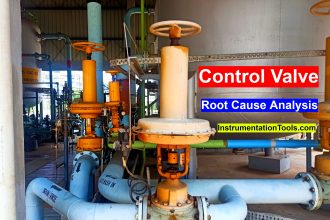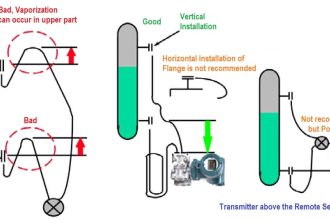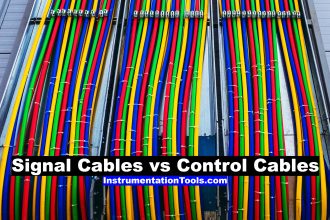Measurement and Instrumentation Objective Questions
51. Which of the following devices should be used for accurate measurement of low D.C. voltage ?
(a) Small range moving coil voltmeter
(b) D.C. potentiometer
(c) Small range thermocouple voltmeter
(d) None of the above
Ans: b
52. It is required to measure the true open circuit e.m.f. of a battery. The best device is
(a) D.C. voltmeter
(b) Ammeter and a known resistance
(c) D.C. potentiometer
(d) None of the above
Ans: c
53. A voltage of about 200 V can be measured
(a) directly by a D.C. potentiometer
(b) a D.C. potentiometer in conjunction with a volt ratio box
(c) a D.C. potentiometer in conjunction with a known resistance
(d) none of the above
Ans: b
54. A direct current can be measured by
(a) a D.C. potentiometer directly
(b) a D.C. potentiometer in conjunction with a standard resistance
(c) a D.C. potentiometer in conjunction with a volt ratio box
(d) none of the above
Ans: b
55. To measure a resistance with the help of a potentiometer it is
(a) necessary to standardise the potentiometer
(b) not necessary to standardise the potentiometer
(c) necessary to use a volt ratio box in conjunction with the potentiometer
(d) none of the above
Ans: b
56. A phase shifting transformer is used in conjunction with
(a) D.C. potentiometer
(b) Drysdale potentiometer
(c) A.C. co-ordinate potentiometer
(d) Crompton potentiometer
Ans: b
57. Basically a potentiometer is a device for
(a) comparing two voltages
(b) measuring a current
(c) comparing two currents
(d) measuring a voltage
(e) none of the above
Ans: a
58. In order to achieve high accuracy, the slide wire of a potentiometer should be
(a) as long as possible
(b) as short as possible
(c) neither too small not too large
(d) very thick
Ans: a
59. To measure an A. C. voltage by using an A.C. potentiometer, it is desirable that the supply for the potentiometer in taken
(a) from a source which is not the same as the unknown voltage
(b) from a battery
(c) from the same source as the unknown voltage
(d) any of the above
Ans: c
60. The stator of phase shifting transformer for use in conjunction with an A.C. potentiometer usually has a
(a) single-phase winding
(b) two-phase winding
(c) three-phase winding
(d) any of the above
Ans: b
61. In an AC. co-ordinate potentiometer, the currents in the phase and quadrature potentiometer are adjusted to be
(a) out of phase by 90°
(6) out of phase by 60°
(c) out of phase by 30°
(d) out of phase by 0°
(e) out of phase by 180°
Ans: a
62. A universal RLC bridge uses
(a) Maxwell bridge configuration for measurement of inductance and De Santas bridge for measurement of capacitance
(b) Maxwell Wein bridge for measurement of inductance and modified De Santy’s bridge for measurement of capacitance
(c) Maxwell Wein bridge for measurement of inductance and Wein bridge for measurement of capacitance
(d) Any of the above.
Ans: b
63. For measurements on high voltage capacitors, the suitable bridge is
(a) Wein bridge
(b) Modified De Santy’s bridge
(c) Schering bridge
(d) Any of the above
(e) None of the above
Ans: c
64. In an Anderson bridge, the unknown inductance is measured in terms of
(a) known inductance and resistance
(b) known capacitance and resistance
(c) known resistance
(d) known inductance
Ans: b
65. Wagner earthing device is used to eliminate errors due to
(a) electrostatic coupling
(b) electromagnetic coupling
(c) both (a) and (b)
(d) none of the above
Ans: a
66. For measurement of mutual inductance we can use
(a) Anderson bridge
(b) Maxwell’s bridge
(c) Heaviside bridge
(d) Any of the above
Ans: c
67. For measurement of inductance having high value, we should use
(a) Maxwell’s bridge
(b) Maxwell Wein bridge
(c) Hay’s bridge
(d) Any of the above
Ans: c
68. If the current in a capacitor leads the voltage by 80°, the loss angle of the capacitor is
(a) 10°
(b) 80°
(c) 120°
(d) 170°
Ans: a
69. In a Schering bridge the potential of the detector above earth potential is
(a) a few volts only
(6) 1 kV
(c) 5 kV
(d) 10 kV
Ans: a
70. To avoid the effect of stray magnetic field in A.C. bridges we can use
(a) magnetic screening
(b) Wagner earthing device
(c) wave filters
(d) any of the above
Ans: a
71. If an inductance is connected in one arm of bridge and resistances in the remaining three arms
(a) the bridge can always be balanced
(b) the bridge cannot be balanced
(c) the bridge can be balanced if the resistances have some specific values
Ans: b
72. A power factor meter has
(a) one current circuit and two pres¬sure circuits
(b) one current circuit and one pressure circuit
(c) two current circuits and one pres¬sure circuit
(d) none of the above
Ans: a
73. The two pressure coils of a single phase power factor meter have
(a) the same dimensions and the same number of turns
(b) the same dimension but different number of turns
(c) the same number of turns but different dimensions
(d) none of the above
Ans: a
74. In a single phase power factor meter the phase difference between the currents in the two pressure coils is
(a) exactly 0°
(b) approximately 0°
(c) exactly 90°
(d) approximately 90°
Ans: c
75. In a dynamometer 3-phase power factor meter, the planes of the two moving coils are at
(a) 0°
(b) 60°
(c) 90°
(d) 120°
Ans: d
76. In a vibrating reed frequency meter the natural frequencies of two adjacent reeds have a difference of
(a) 0.1 Hz
(b) 0.25 Hz
(c) 0.5 Hz
(d) 1.5 Hz
Ans: c
77. In a Weston frequency meter, the magnetic axes of the two fixed coils are
(a) parallel
(b) perpendicular
(c) inclined at 60°
(d) inclined at 120°
Ans: b
78. A Weston frequency meter is
(a) moving coil instrument
(b) moving iron instrument
(c) dynamometer instrument
(d) none of the above
Ans: b
79. A Weston synchronoscope is a
(a) moving coil instrument
(b) moving iron instrument
(c) dynamometer instrument
(d) none of the above
Ans: c
80. In a Weston synchronoscope, the fixed coils are connected across
(a) bus-bars
(b) incoming alternator
(c) a lamp
(d) none of the above
Ans: b
81. In Weston synchronoscope the moving coil is connected across
(a) bus-bars
(b) incoming alternator
(c) fixed coils
(d) any of the above
Ans: a
82. The power factor of a single phase load can be calculated if the instruments available are
(a) one voltmeter and one ammeter
(b) one voltmeter, one ammetqr and one wattmeter
(c) one voltmeter, one ammeter and one energy meter
(d) any of the above
Ans: b
83. The desirable static characteristics of a measuring system are
(a) accuracy and reproducibility
(b) accuracy, sensitivity and reproducibility
(c) drift and dead zone
(d) static error
Ans: b
84. The ratio of maximum displacement deviation to full scale deviation of the instrument is called
(a) static sensitivity
(b) dynamic deviation
(c) linearity
(d) precision or accuracy
Ans: c
85. Systematic errors are
(a) instrumental errors
(b) environmental errors
(c) observational errors
(d) all of the above
Ans: d
86. Standard resistor is made from
(a) platinum
(b) maganin
(c) silver
(d) nichrome
Ans: b
87. Commonly used standard capacitor is
(a) spherical type
(b) concentric cylindrical type
(c) electrostatic type
(d) multilayer parallel plate type
Ans: b
88. Operating torques in analogue instruments are
(a) deflecting and control
(b) deflecting and damping
(c) deflecting, control and damping
(d) vibration and balancing
Ans: c
89. Commonly used instruments in power system measurement are
(a) induction
(b) moving coil or iron
(c) rectifier
(d) electrostatic
Ans: a
90. Damping of the Ballistic galvanometer is made small to
(a) get first deflection large
(b) make the system oscillatory
(c) make the system critically damped
(d) get minimum overshoot
Ans: a
91. If an instrument has cramped scale for larger values, then it follows
(a) square law
(b) logarithmic law
(c) uniform law
(d) none of the above
Ans: b
92. Volt box is a component to
(a) extend voltage range
(6) measure voltage
(c) compare voltage in a box
(d) none of the above
Ans: a
93. E.m.f. of a Weston cell is accurately measured by
(a) electrostatic voltmeter
(b) hot wire voltmeter
(c) isothermal voltmeter
(d) electrodynamic voltmeter
Ans: a
94. The gravity controlled instrument has crowded scale because current is proportional to
(a) balancing weight
(b) deflection angle
(c) sine of deflection angle
Ans: c
95. A sensitive galvanometer produces large deflection for a
(a) small value of current
(b) large value of current
(c) large value of power
(d) large value of voitage
(e) none of the above
Ans: a
96. A multirangq instrument has
(a) multiple shunt or series resistances inside the meter
(b) multicoii arrangement
(c) variable turns of coil
(d) multi range meters inside the measurement system
(e) any of the above
Ans: a
97. The rectifier instrument is not free from
(a) temperature error
(b) wave shape error
(c) frequency error
(d) all of the above
Ans: c
98. Alternating current is measured by
(a) induction ammeter
(b) permanent magnet type ammeter
(c) electrostatic ammeter
(d) moving iron repulsion type voltmeter
Ans: a
99. Most sensitive galvanometer is
(a) elastic galvanometer
(b) vibration galvanometer
(c) Duddlb galvanometer
(d) spot ballistic galvanometer
Ans: d
100. Instrument transformers are
(a) potential transformers
(b) current transformers
(c) both (a) and (b)
(d) power transformers
Ans: c
101. An instrument transformer is used to extend the range of
(a) induction instrument
(b) electrostatic instrument
(c) moving coil instrument
(d) any of the above
Ans: a
102. Wattmeter cannot be designed on the principle of
(a) electrostatic instrument
(b) thermocouple instrument
(c) moving iron instrument
(d) electrodynamic instrument
Ans: c
103. In an energymeter braking torque is produced to
(a) safe guard it against creep
(b) brake the instrument
(c) bring energy meter to stand still
(d) maintain steady speed and equal to driving torque
Ans: d
104. Various adjustments in an energy meter include
(a) light load or friction
(b) lag and creep
(c) overload and voltage compensation
(d) temperature compensation
(e) all of the above
Ans: e
105. The power of a n-phase circuit can be measured by using a minimum of
(a) (n – 1) wattmeter elements
(b) n wattmeter elements
(c) (n + 1) wattmeter elements
(d) 2n wattmeter elements
Ans: a
106. Two holes in the disc of energymeter are drilled at the opposite sides of the spindle to
(a) improve its ventilation
(b) eliminate creeping at no load
(c) increase its deflecting torque
(d) increase its braking tcrque
Ans: b
107. Which of the following is measured by using a vector voltmeter ?
(a) Amplifier gain and phase shift
(b) Filler transfer functions
(c) Complex insersion loss
(d) All of the above
Ans: d
108. The principle on which vector voltmeter is based is
(a) that it works on the principle of complex variation
(b) that it measures the response of linear ramp voltage
(c) same as digital meter
(d) that it measures the amplitude of a single at two points and at the same time measures their phase difference
Ans: d
109. To measure radio frequency, the suitable frequency meter is
(a) Weston frequency meter
(b) reed vibrator frequency meter
(c) hetrodyne frequency meter
(d) electrical resonance frequency meter
Ans: c
